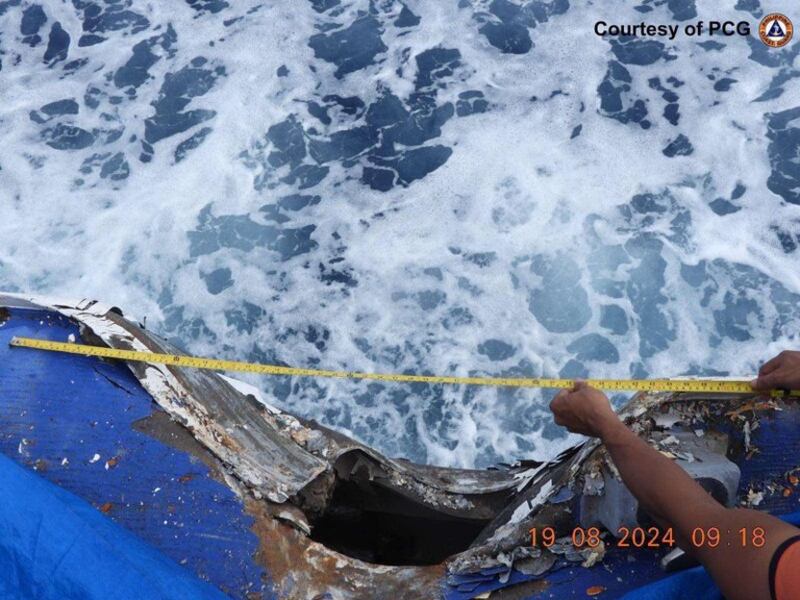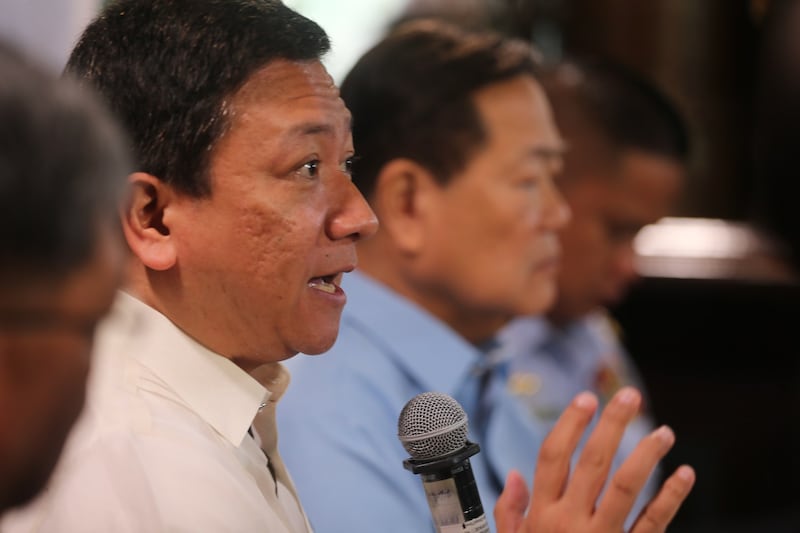At least two vessels were damaged when Chinese and Philippine coast guard ships collided during a standoff at sea in disputed waters Monday, officials said.
The two nations, both South China Sea territorial claimants, accused each other of instigating at least a pair of collisions in Monday's incident. It occurred after Manila and Beijing had agreed last month to establish a hotline to better manage and ease tensions in the waterway.
The incident happened before dawn when Philippine Coast Guard (PCG) vessels BRP Bagacay and BRP Cape Engaño were en route to the Flat (Patag) and Nanshan (Lawak) islands in the West Philippine Sea, Manila said. That is Manila’s name for South China Sea waters within its exclusive economic zone.
“These dangerous maneuvers resulted in collisions, causing structural damage to both PCG vessels,” said Jonathan Malaya, assistant director general of the National Task Force for the West Philippine Sea.

The first incident occurred at 3:24 a.m., about 23 nautical miles southeast of Shabina (Escoda) Shoal, when the Cape Engaño was targeted with “aggressive maneuvers” by China Coast Guard (CCG) vessel 3104, Malaya told a media forum Monday.
“This resulted in a collision with the starboard beam of the vessel, creating a hole on the deck with an approximate diameter of five inches,” Malaya said.
Less than 20 minutes later, BRP Bagacay “was rammed twice on both her port and starboard sides” by another ship, identified as CCG vessel 21551, he said.
The Bagacay sustained a large hole, approximately 2.5 feet by three feet, said Commodore Jay Tarriela, the Philippine coast guard’s spokesman for the West Philippine Sea.
“This is the biggest structural damage that we have incurred as a result of the dangerous maneuvers carried out by the Chinese Coast Guard,” he said.
Both the Flat and Nanshan islands are part of the Spratly Islands, which are claimed, wholly or in part by Brunei, China, Malaysia, the Philippines, Vietnam and Taiwan.
Conflicting narratives
China blamed the PCG for the incident, saying the Philippine ships ignored repeated warnings and “acted dangerously by deliberately ramming the China Coast Guard vessel that was carrying out [a] law enforcement operation.”
"The responsibility [for] causing the collision fully lies with the Philippines. China Coast Guard took necessary measures in accordance with domestic and international law," foreign ministry spokeswoman Mao Ning said at a news conference Monday.

The Chinese coast guard said the Philippines was “entirely responsible for the collision.”
“We warn the Philippine side to immediately stop its infringement and provocation, otherwise it will bear all the consequences arising from that,” CCG spokesperson Gan Yu said.
Manila-Beijing deal
The latest incident occurred after both sides, in early July, had committed to calming tensions following a series of confrontations at sea.
Beijing and Manila agreed to make efforts to lower the temperature in the wake of a standoff in mid-June between Chinese and Philippine forces during a resupply mission near Second (Ayungin) Thomas Shoal in June, during which a Filipino serviceman lost a thumb.
Monday's incident came less than two weeks after two Chinese Air Force planes allegedly dropped flares in the path of the Philippine Air Force NC-212i plane over Scarborough Shoal, forcing it to turn around for the safety of its pilots and crew.
After the latest incident, the Philippines called on Beijing to adhere to the United Nations Convention on the Law of the Sea, or UNCLOS, “to prevent further escalations and ensure the safety of all vessels operating in the region,” Malaya said.
China also urged Manila to keep its agreement with Beijing to manage their sea disputes.
“We hope the Philippines will honor its commitment, earnestly observe the understandings and arrangement reached with China, refrain from taking actions that may complicate the situation, and work with China to get the situation at sea under control,” Mao, the foreign ministry spokeswoman, said.
BenarNews is an RFA-affiliated online news organization. Jeoffrey Maitem, Mark Navales and Jojo Riñoza in Manila contributed to this report.
